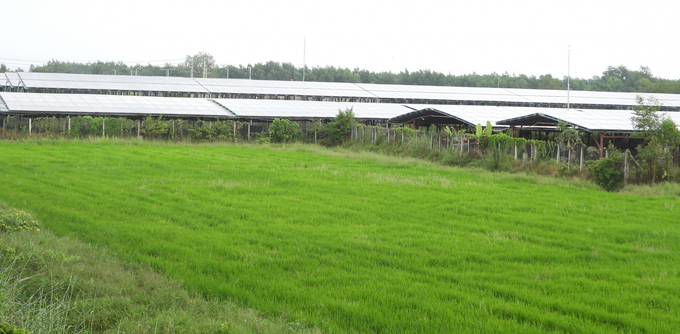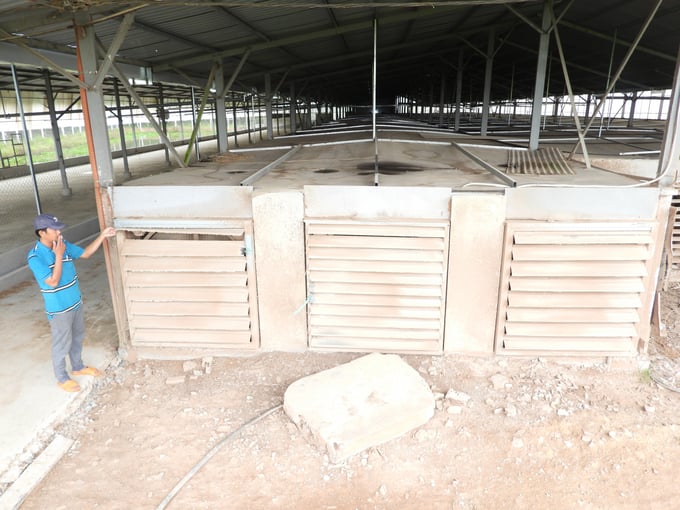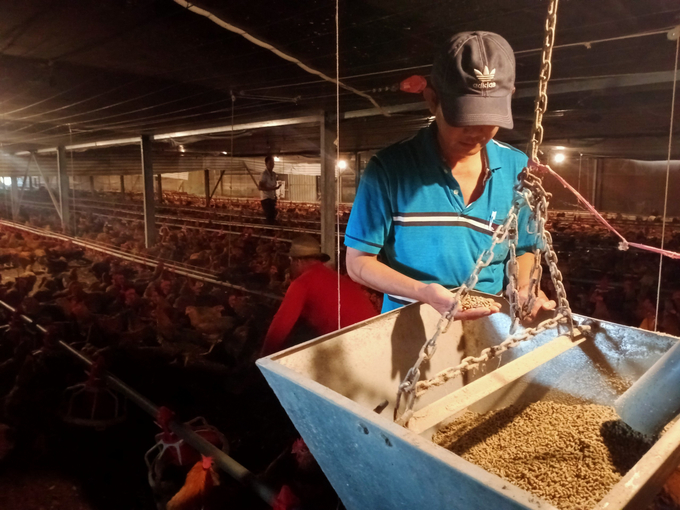May 19, 2025 | 03:46 GMT +7
May 19, 2025 | 03:46 GMT +7
Hotline: 0913.378.918
May 19, 2025 | 03:46 GMT +7
Hotline: 0913.378.918
The biosafety chicken farm under the solar-powered roof of Ms. Tran Thi Hanh in Thanh Long border commune, Chau Thanh district (Tay Ninh) is a vertical solar power system of more than 3 hectares in the middle of the wing. The flat plain is surrounded by green rubber forests.

The chicken farm under a solar-powered roof is located in the middle of a flat field, owned by Ms. Tran Thi Hanh in Thanh Long border commune, Tay Ninh province. Photo: Tran Trung.
A completely different space is located within the solar power generation area. There are rows of industrial biosafety chicken coops that are spacious, clean, and no bad odor. Each group of workers is assigned a distinct job: one group prepares the biological products for the chickens to drink, another harvests the eggs, others harvest available commercial chickens and so on. The daily activities break the quiet space of the border rural area.
Ms. Hanh told us her story: With the family tradition of raising chickens on a farm, she owned a large colored feathered chicken farm with a scale of over 10,000 chickens before 2014. However, at that time, the farm's output mainly depended on the traditional market, so she had to focus on raising livestock and worry about the product consumption market, so the selling efficiency was not high. In addition, the outbreak of avian flu made production even more difficult, to which she had to suspend the farm's operation to preserve capital.

Chickens are raised in cold coops powered by solar energy. Photo: Tran Trung.
After consideration and with the determination to revive the family's chicken farming tradition, she discovered that the land fund in Long Thanh border commune was still ample during one of her business trips. The infrastructure was still lacking and limited, so the land is relatively cheap, and the population is sparse. This location has a relatively high background temperature, and 2020 was the year of the solar power trend. After inquiring for the local policies, she decided to invest in building an electric farm. Utilizing her previous experience in chicken farming, she constructed an industrial-scale chicken farm system with nearly 60,000 chickens raised in cold coops and follow biosecurity standards completely.
According to Ms. Hanh, unlike the farms she has invested in before, this farm produces commercial colored feathered chickens as well as raises Egyptian chickens for eggs. The farm is invested on an industrial scale with many advanced and modern equipment ranging from cooling system, heating system, lighting system to feeding and drinking system, all of which are automatic, so it consumes a substantial amount of electricity.

Thanks to raising chickens following organic standards and using biological products, the farm does not emit odors and pollute the environment. Photo: Tran Trung.
As a result, Ms. Hanh invested in a solar power system with a capacity of nearly 100KW to serve the needs of production electricity as well as meet the daily needs of workers. Although the initial investment cost is relatively high at nearly 2 billion VND. Consequently, the farm has solved all 3 major problems: reduced the cost of construction; cut down maintenance costs; and removed complete dependency on the national electricity grid, so the farm can focus on being proactive in production. Since the beginning of 2020, she has saved nearly 100 million VND in electricity bills every month.
In addition, the farm stops breeding for 10 to 15 days to disinfect after each litter of chicken, so the farm earns extra income by selling electricity to the power company. As a result, she has obtained "double benefits" in reducing electricity costs, maintaining safety for the environment and taking advantage of intervals between breeding periods. "I am continuing to invest in 3 similar farms to expand the production scale", Ms. Hanh revealed her future business plans.

Fully automatic feeding system. Photo: Tran Trung.
According to Tay Ninh Department of Agriculture and Rural Development, solar power has been utilized in many other farms in the province. This farm model has outstanding advantages such as proactivity in electricity for daily life and production; Appealing, convenient design, that can completely replaces traditional roofing materials such as concrete, corrugated iron, plastic, etc.; high insulation capacity to keep the farm cooler, lower production costs, and contributing to environmental protection, reducing the pressure of load compensation for the national power grid.
The province has nearly 110 agricultural solar-powered roof projects, including 3 solar power projects built, completed and put into operation in 2019; 107 projects completed and put into operation in 2020. Most of the agricultural projects focus on growing mushrooms and cloves; a few projects specialize raising pigs, chickens and cows.
“Tay Ninh is a province with favorable conditions for putting solar power technology into mass application because it has an average sunlight density of approximately 1,500 hours/year, averaging at 4 hours of sunlight per day. Although the initial investment cost is quite high, many businesses have boldly invested and applied solar power technology in agricultural production and are achieving double benefits”, said Mr. Nguyen Dinh Xuan, Director of Tay Ninh Department of Agriculture and Rural Development.
Translated by Nguyen Hai Long

(VAN) Minister of Agriculture and Environment Do Duc Duy held a meeting with Soopakij Chearavanont, Chairman of C.P. Group, on May 15.
/2025/05/16/3800-0-nongnghiep-143756.jpg)
(VAN) Suntory PepsiCo Vietnam coordinated with the Ministry of Education and Training to implement an education program on water conservation, reaching nearly 1 million primary school students nationwide.

(VAN) Vietnam’s TH Group officially put its high-tech fresh milk processing plant into operation in the Russian Federation, marking a historic moment as the first TH true MILK cartons were produced in Russia.

(VAN) Use of high-quality broodstock and biotechnology is regarded as the most effective approach to ensuring sustainable and economically viable shrimp aquaculture ahead of climate change and the emergence of increasingly intricate disease patterns.

(VAN) Carbon farming is a form of agricultural practices that helps absorb more greenhouse gases than it emits, through smart management of soil, crops, and livestock.

(VAN) This is a key content of the Memorandum of Understanding recently signed between the Vietnam Fisheries Society and Kunihiro Inc of Japan.

(VAN) To achieve the goal, local authorities and businesses in Kon Tum province have fully prepared the necessary conditions for the new Ngoc Linh ginseng planting season.